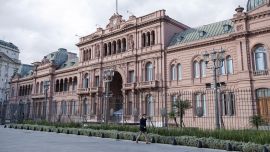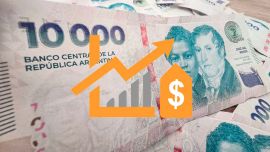By almost every reckoning, Argentina’s US$65-billion debt restructuring will be approved by a wide margin this weekend. But investors are on alert for the small risk that holdouts could make things complicated.
While there’s little threat to the broad plan for most creditors to accept new bonds valued at an average of 55 cents on the dollar, some notes could be left out of the accord. Securities issued in 2005 and 2010 have rules that make it easier for a minority of investors to try to hold out for more generous terms.
The idea of holdouts brings up painful memories for Argentina investors who lived through a decade of court battles following the country’s 2001 default, a dispute that left Argentine assets vulnerable to seizure and locked the nation out of international debt markets. Avoiding the drama this time around would bolster confidence that the government has a manageable debt load and can focus on repairing an economy set to contract for a third straight year.
“There are so many Argentina bonds out there, there’s a non-zero chance that there’s some hedge fund with a lot of them, and you may have a series that doesn’t get restructured,” said Jared Lou, a money manager at William Blair Investment. “It’s still a low risk. I think this deal is likely to be approved.”
Argentine creditors have until the end of today to accept the deal, and the government could announce the results as soon as August 31. The plan has the support of three major creditor groups – with members including BlackRock Inc., Fidelity Investments and Monarch Alternative Capital – who say it provides fair compensation for investors along with the best chance for Argentina to get back on its feet.
For the country’s debt load to be sustainable, Argentina will need to reverse three straight years of economic contraction, including what JP Morgan forecasts will be a 13.5 percent plunge this year amid the coronavirus lockdown. The peso has tumbled 75 percent since the end of 2017, the worst performance among more than 100 currencies tracked by Bloomberg, even though it has been under capital controls since September.
About two-thirds of the $65 billion in foreign debt Argentina is trying to restructure was issued after the nation returned to global capital markets in 2016. It’s governed by rules that force all holders to accept a restructuring as long as two-thirds of all investors and at least half of the owners of each individual series of bonds vote to go along with it.
The main risk of holdouts are from some securities issued before then, which have a higher threshold for restructuring. For these so-called exchange notes, the government needs 85 percent of all investors and at least two-thirds of the owners of each series to accept the proposal.
The smaller series could be especially vulnerable, since a blocking stake wouldn’t require as much capital and a few hedge funds could team up to form a coalition. Many of the holders are also widely dispersed around the world, making it more difficult to collect the votes needed to push through a deal.
But the plan has received broad enough support that creditors who hold out are unlikely to win sympathy from those who negotiated for months to reach a deal with Argentina, according to Anna Gelpern, a law professor at Georgetown University.
“By definition there is a risk of failure. Emotions are running high here, and someone might act rashly,” Gelpern said. “But just to take a step back, I don’t see how it’s in anybody’s interest at this point to blow this up.”
by Jorgelina do Rosario & Scott Squires, Bloomberg




















Comments